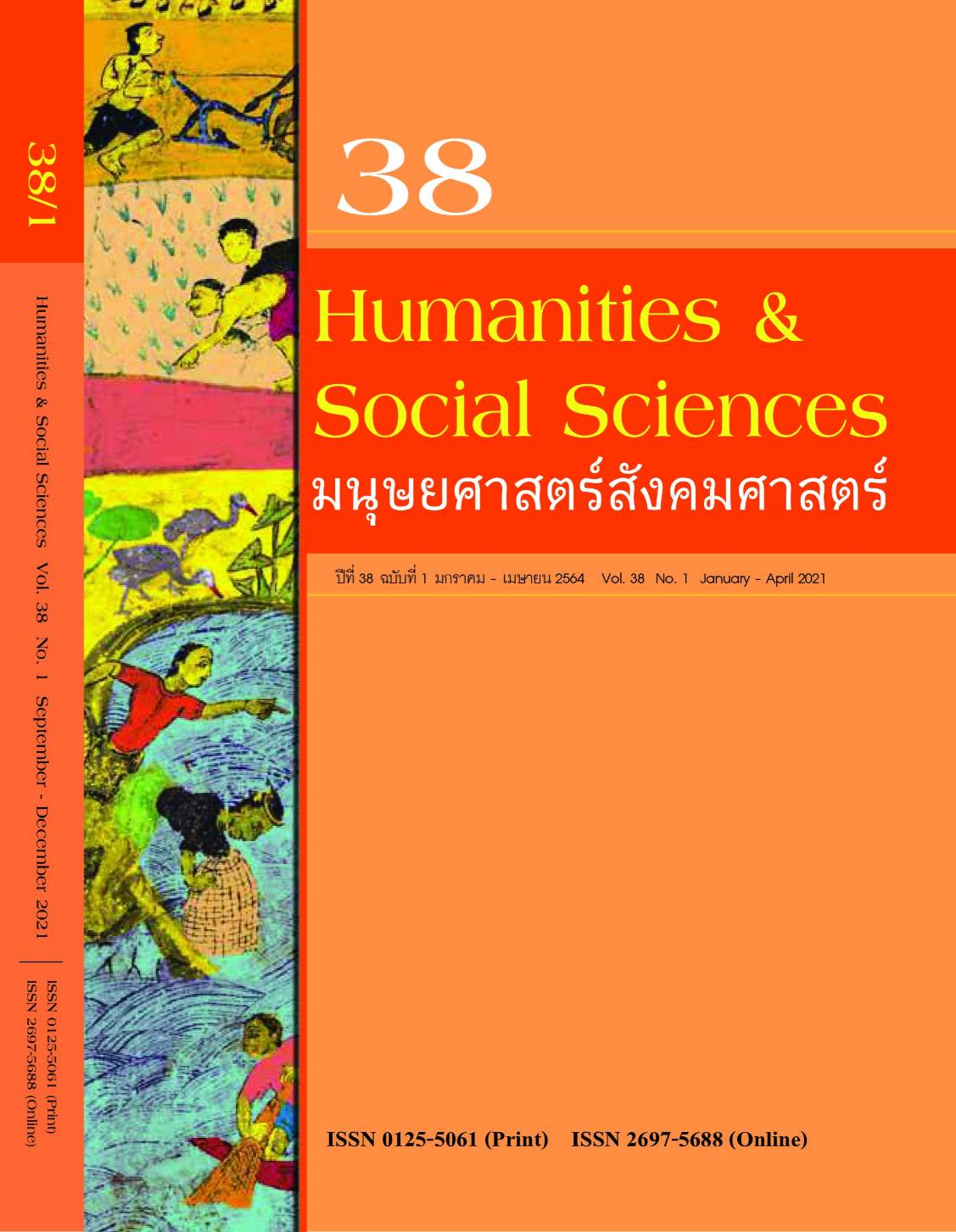บททดลองเสนอว่าด้วยการเสริมสร้างวัฒนธรรมทางการเมืองแบบพลเมืองกับการขจัดปัญหาความเหลื่อมล้ำทางสังคม : มุมมองทางสังคมวิทยาการเมือง
An Introductory Essay of Civic Culture and The Eliminating of Social Inequality : The Political Sociology Perspective
Keywords:
social inequality, civic culture, democratic political culture, citizenship, civic consciousnessAbstract
Abstract
This academic article has argued that the democracy and economic development around the world is facing serious social inequality issues. Currently, Thai society is also facing this severe problem. The problem of social inequality in Thai society has many dimensions. But when analyzing the main cause factors, it was found that there are two things, the first is from the structural problems of Thai society, the second is due to the weakness of the basis of Thai political culture and the behavior of people in society. Both of these are interrelated. Causing Thai society to have been trapped in social inequality for a long time. Throughout the period many past years, The Thai state has sought to reduce inequality and create social equality but the consequences of the solution have not been successful. It still just a policy and roadmap. There is no any practical effect. In this article trial to propose a solution to eliminating the problem of social inequality in the political sociology perspective. By creating a civic culture or a brand - new political culture. People must have the fundamental beliefs that they have political efficacy as following. First, to solving the problem of social inequality is a primary duty of everyone to be attentive and have a shared responsibility to push forward or take action. Everyone cannot deny their responsibility. Second, people must believe that they are one of the political forces that have the capability of changing the problem of social inequality in a better direction and must participate in the operation as a driving force to seriously keep improve this problem.
Keywords : social inequality, civic culture, democratic political culture, citizenship
References
http://sociallistthai.com.
ไกรยส ภัทราวาท. (2561). ไทยจะลงจาก top 3 ประเทศที่เหลื่อมล้ำที่สุดในโลกได้อย่างไร?. สืบค้น
จาก http://www.eef.or.th.
คณะกรรมการปฏิรูป (คปร.). (2554). แนวทางการปฏิรูปประเทศไทย: ข้อเสนอต่อพรรคการเมืองและ
ผู้มีสิทธิ์เลือกตั้ง.กรุงเทพฯ: หจก.บางกอกบล็อก.
จิตติมา กุลประเสริฐรัตน์. (2561). “ความเหลื่อมล้ำในกระบวนการยุติธรรม”.สืบค้นจาก
https://www.thaipost.net/main/detail/19896.
ชัยอนันต์ สมุทวณิชและคณะ. (2553). “วัฒนธรรมพลเมือง.” วารสารสถาบันวัฒนธรรมและศิลปะ
มหาวิทยาลัยศรีนครินทรวิโรฒ,11,(2)(22).7 - 10.
ทินพันธุ์ นาคะตะ. (2543). ประชาธิปไตย.(พิมพ์ครั้งที่ 2) กรุงเทพฯ : สหายบล็อกและการพิมพ์.
________________. (2546). วัฒนธรรมทางการเมืองของคนรุ่นใหม่. กรุงเทพฯ : สหายบล็อกและ
การพิมพ์.
________________. (2555). การเมืองไทย : ระบบที่ไม่มีสูตรสำเร็จรูปในการแก้ไขปัญหา.
กรุงเทพฯ : ปัญญาชน.
ทิพย์พาพร ตันติสุนทร. (2553). ไปดู Civic Education ที่เยอรมัน (ตอนที่ 3) มนุษย์ไม่มียีน
ประชาธิปไตยในตัวเอง.สถาบันนโยบายศึกษา. สืบค้นจาก http://www.fpps.or.th.
ป๋วย อึ้งภากรณ์. (2512). ศีลธรรมและศาสนาในการพัฒนาชาติในปาฐกถาอนุสรณ์ซินแคลร์ ทอมป์
สัน ค.ศ.1969. วิทยาลัยพระคริสตธรรมในประเทศไทยและสภาคริสตจักรในประเทศไทย 21- 23 มกราคม 2512.
ประมวล รุจนเสรี. (2551). ปฏิวัติวัฒนธรรม. กรุงเทพฯ: พรรคประชามติ.
ประเวศ วะสี. (2562). “ความเหลื่อมล้ำในโครงสร้างอำนาจรัฐ” ปาฐกถาพิเศษในการประชุมวิชาการ
สถาบันพระปกเกล้า เรื่อง ลดช่องว่างความเหลื่อมล้ำ สร้างคุณภาพประชาธิปไตย ครั้งที่ 21 ณ ศูนย์ประชุมสหประชาชาติ วันที่ 2 พฤศจิกายน 2562 กรุงเทพมหานคร.
พรอัมรินทร์ พรหมเกิด. (2556). สังคมวิทยาการเมือง. (พิมพ์ครั้งที่ 2). ขอนแก่น : โรงพิมพ์
มหาวิทยาลัยขอนแก่น.
________________. (2557 ก.). “วัฒนธรรมทางการเมืองของประชาชนกับการพัฒนาประชาธิปไตย.”
วารสารวิชาการโรงเรียนนายเรือ.(ฉบับปฐมฤกษ์). 1:1, หน้า 83 - 91.
________________. (2557 ข.). “การพัฒนาประชาธิปไตยกับการสร้างวัฒนธรรมทางการเมืองแบบ
ประชาธิปไตย.” รัฐสภาสาร.62: 7 (กรกฎาคม),หน้า 9 - 44.
________________. (2558.). “ปฏิรูปการเมืองไทยด้วยการพัฒนาวัฒนธรรมทางการเมืองแบบ
ประชาธิปไตย: สู่เส้นทางใหม่ที่ดีกว่า” รัฐสภาสาร. 63,11 (พฤศจิกายน).หน้า 9 - 34.
พรอัมรินทร์ พรหมเกิด และคณะ. (2562). “เครือข่ายกลุ่มอิทธิพลกับการทุจริตคอร์รัปชันอย่างเป็น
ระบบในภาคการศึกษา : กรณีการทุจริตคอร์รัปชันจากโครงการก่อสร้างสนามฟุตซอลและสหกรณ์ออมทรัพย์ครู.” วารสารสถาบันพระปกเกล้า. 17,3 (กันยายน –ธันวาคม) หน้า 114 -134.
ราชกิจจานุเบกษา. (2560). รัฐธรรมนูญแห่งราชอาณาจักรไทย พุทธศักราช 2560.สืบค้นจาก
https://www.ilaw.or.th.
ลมเปลี่ยนทิศ. (2562). “ทำ QE อัดฉีดในประเทศ.” ไทยรัฐ ฉบับวันพฤหัสที่ 21 พฤศจิกายน, หน้า 5.
วิทยากร เชียงกูล. (2561). “ปฏิรูปประเทศไทย.” สืบค้นจาก
https://www.bangkokbiznewss.com/blog/detail/646151.
วิทย์ เที่ยงบูรณธรรม. (2554). พจนานุกรมอังกฤษ – ไทย. กรุงเทพฯ : ซีเอ็ดยูเคชัน.
วรัญญา ศรีริน และพรอัมรินทร์ พรหมเกิด. (2562).. “วัฒนธรรมทางการเมืองแบบพลเมืองกับการลด
ความเหลื่อมล้ำทางสังคม” บทความเสนอในการประชุมวิชาการสถาบันพระปกเกล้า เรื่อง ลดช่องว่างความเหลื่อมล้ำ สร้างคุณภาพประชาธิปไตย. ครั้งที่ 21 ณ ศูนย์ประชุมสหประชาชาติ วันที่ 2 พฤศจิกายน 2562 กรุงเทพมหานคร.
วิชิตวงศ์ ณ ป้อมเพชร. (2553). หลักคิดในการปฏิรูปประเทศไทย. กรุงเทพฯ : วศิระ.
วิชัย ตันศิริ. (2551). วัฒนธรรมพลเมือง.กรุงเทพฯ : สถาบันนโยบายศึกษา.
สมชัย จิตสุชน. (2561). ความเหลื่อมล้ำในสังคมไทย: แนวโน้ม นโยบายและแนวทางขับเคลื่อน
นโยบาย. สถาบันการวิจัยเพื่อพัฒนาประเทศไทย.ธนาคารแห่งประเทศไทย.
สมชัย จิตสุชน. (2563). “ความเหลื่อมล้ำ 2020 : เรารู้อะไร เราควรรู้อะไร”.สืบค้นจาก
TDRI.or.th/2020/01/
สถาบันพระปกเกล้า. (2562). หลักการและเหตุผลการประชุมวิชาการสถาบันพระปกเกล้า ครั้งที่ 21
ประจำปี 2562 เรื่อง ลดช่องว่างความเหลื่อมล้ำ สร้างคุณภาพประชาธิปไตย.สืบค้นจาก http://www.kpi.ac.th/..
สำนักงานคณะกรรมการพัฒนาการเศรษฐกิจและสังคมแหงชาติ. (2557).รายงานการวิเคราะห์สถาน
การณความยากจนและความเหลื่อมล้ำในประเทศไทย ป 2555.สืบคนจากhttp://social.nesdb.go.th/.
สำนักงานคณะกรรมการพัฒนาการเศรษฐกิจและสังคมแห่งชาติ.(2558).รายงานการวิเคราะห์
สถานการณ์ความยากจนและความเหลื่อมล้ำในประเทศไทย ปี 2556.กรุงเทพฯ: บริษัท บี.ซี.เพรส (บุญชิน) จำกัด.
สำนักงานส่งเสริมเศรษฐกิจดิจิดัล กระทรวงดิจิทัลเพื่อเศรษฐกิจและสังคม.(2562).ความเป็นพลเมือง
ดิจิทัล: พลเมืองแห่งศตวรรษที่ 21.สืบค้นจาก https://thaidigizen.com/contact/.
Almond, G. A. & Verba, S. (1963). The Civic Culture : Political Attitudes and
Democracy in Fives Nations. Boston : Little, Brown & Company.
Almond, G. A. & Verba, S. (1965). The Civic Culture : Political Attitudes and
Democracy in Fives Nations, Boston : Little, Brown & Company.
Almond, G. A. & Verba, S, eds. (1980). The civic Culture Revisited. London : SAGE.
Inglehart, F.R. & Wayne, E. B. (2000). “Modernization, Cultural Change, and the
Persistence of Traditional Values” American Sociological Review,65 (1).19 - 51.
Putnam, Robert D., Leonardi, Robert & Nonetti, Raffaella Y. (1993). Making Democracy
Work : Civic Traditions in Modern Italy. New Jersey : Princeton University.
Hemingway, Ernest. (1937). To Have and Have Not. (First Edition). London : Charles
Soibner’s Sons.
Heywood, Andrew. (2007). Politics. (Third Edition).New York : PALGRAVE MACMILLAN.
Huntington, S.P. (1991). The Third Wave : Democratization in the Twentieth
Century. Oklahoma, United States : University of Oklahoma Press
William, G. (2016). Building a democratic political culture. Search on http://
www.researchgate.net/publication. (accessed 10 May 2020).



